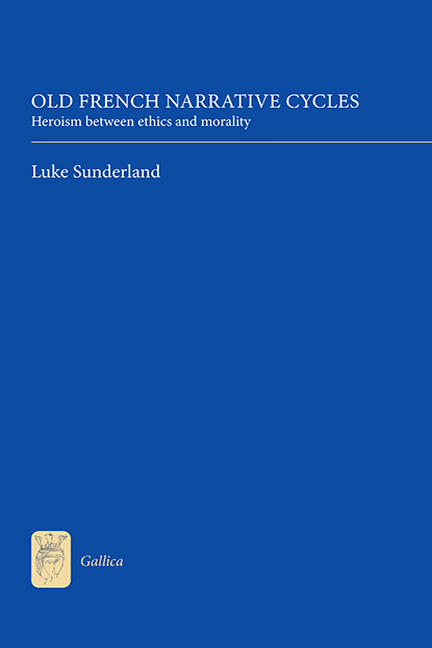Book contents
- Frontmatter
- Contents
- Dedication
- Acknowledgments
- Manuscripts of the Cycle de Guillaume
- Manuscripts of the Roman de Renart
- References and Abbreviations
- Introduction
- 1 Duty to the Geste: The Cycle de Guillaume d'Orange
- 2 Metaphor, Metonymy and Morality: The Vulgate Cycle
- 3 Responsibility to Reputation: The Prose Tristan
- 4 Ethical Evil: The Roman de Renart
- Conclusion
- Bibliography
- Index
- Miscellaneous EndMatter
3 - Responsibility to Reputation: The Prose Tristan
Published online by Cambridge University Press: 09 May 2017
- Frontmatter
- Contents
- Dedication
- Acknowledgments
- Manuscripts of the Cycle de Guillaume
- Manuscripts of the Roman de Renart
- References and Abbreviations
- Introduction
- 1 Duty to the Geste: The Cycle de Guillaume d'Orange
- 2 Metaphor, Metonymy and Morality: The Vulgate Cycle
- 3 Responsibility to Reputation: The Prose Tristan
- 4 Ethical Evil: The Roman de Renart
- Conclusion
- Bibliography
- Index
- Miscellaneous EndMatter
Summary
The most common version of the Prose Tristan (c. 1230–1235), known as V2, has two ostensible purposes: first, to tell the complete life story of Tristan, and second, to give a comprehensive account of Arthurian history. To fulfil the first aim, the Tristan expands existing twelfth-century poems about the character, adding an account of his ancestry and childhood. But, crucially, it also reworks the verse tradition, making fundamental changes to the donnée tristanesque (the legend of Tristan as a martyr to love). In the prose text, Tristan is no longer primarily a heroic, ill-starred lover but first and foremost a knight who seeks to earn and protect his reputation. The change in the nature of the character Tristan helps to fulfil the second aim: the text completes Arthurian history by turning Tristan into an Arthurian knight. It thereby implicitly accuses its model and predecessor, the Vulgate Cycle, of being incomplete due to Tristan's absence; thus writing Tristan's narrative is first and foremost the filling of a lacuna in Arthurian textuality. Tristan is in fact present in the Vulgate, but only elliptically, as a story not told. His fate is alluded to as part of the recent past: ‘n'a pas encore cinc anz que Tristans […] morut, li niés le roi Marc, qui si loiaument ama Yseut la blonde’ [five years have not yet passed since King Mark's nephew Tristan died, he who so faithfully loved Iseut the Blonde] (Mor, 71). Because it fills this lack, the Tristan appears to be an attempt to replace the Vulgate altogether, to render it superfluous. It incorporates material about the Grail quest copied verbatim from the Queste del Saint Graal (part of the Vulgate), so that the reader might have no need to leave the self-sufficient world of the Tristan.
Through Derrida's concept of the ‘supplement’ – a complement that ‘completes’ a whole but also thereby exposes that whole's incompleteness – I wish to argue that the Tristan's attempt to perfect the Vulgate in fact opens up a chain of additions that never ‘add up’ to a single, complete text. Both an unnecessary extra and an essential addition, the ‘supplement’ is grafted onto a whole, thus perfecting something that actually seemed perfect in itself, prior to the addition of the supplement.
- Type
- Chapter
- Information
- Old French Narrative CyclesHeroism between Ethics and Morality, pp. 101 - 137Publisher: Boydell & BrewerPrint publication year: 2010

